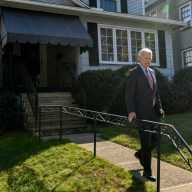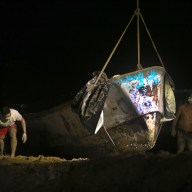 Documentarian R.J. Cutler next to the star of “The World According to Dick Cheney.”
Documentarian R.J. Cutler next to the star of “The World According to Dick Cheney.”
Credit: David Stubbs/Showtime
Dick Cheney refers to himself as the “most consequential” vice president in American history, and a new, incredibly candid documentary by R.J. Cutler (“The September Issue”) delves into just what those consequences might be — though Cheney quickly proves himself to be not one for re-evaluation. After premiering the film at the Sundance Film Festival earlier this year, Cutler brings his portrait of the divisive political figure to Showtime.
Was it difficult to set aside whatever opinions you might have had of Cheney to make this film?
I mean, of course I have opinions about him. I have my politics, but this isn’t really a film about politics — from my perspective. I’ve made films about people whose politics I agree with and I’ve made films about people whose politics I don’t agree with. In this case, I’m exploring the man but I’m also telling his story from what I believe will be a rich and valuable historical perspective as time passes.
So my politics are kind of beside the point. Really beside the point. I’m not interested in films about my politics. I’m interested in Dick Cheney. I could not possibly care less about the politics of a documentary filmmaker. I was curious about who he was and how he thinks and what led him to the decisions he made, and how he acquired the power that he had and what he did with that power once it was acquired.
What do you think of the manner in which Bush and Cheney have in a way retreated from the public stage since leaving office?
Vice President Cheney has not shied away from the public eye and has not resisted the temptation to opine on the current administration and its policies and its relationship to the policies he supported when he was in office. He appears to be breaking the mold in terms of that return to center stage.
We do live in a moment where the opportunity to return to center stage is far more present than it was 8 years, 12 years, 16 years ago, 20 years ago. But even in that context I think it’s interesting how much he’s staying in the fray. But you know, there are no laws or rules that say you can’t remain in the fray. Bill Clinton has remained in the fray in a different way. He hasn’t really retreated. I don’t agree with you necessarily just as an observer of politics about former President [George W.] Bush. He seems to be laying pretty low in the way that former presidents historically have done. I know he’s given a speech or two, but I don’t really feel like we’re hearing from him in the way we’ve consistently been hearing from [former] Vice President Cheney.
There’s a lot of conjecture and hyperbole about Cheney while he was in office, especially in the second term, from social critics and comedians. Was it difficult to avoid that level of discourse?
No, not really. It’s not at all difficult to avoid the level of discourse because I focused on serious-minded people who had examined his life and career and had written extensively about it. It’s an extremely prominent group of both supporters and detractors in the film. You know, the emotion of the debate and the more extreme theories that Cheney’s detractors developed. … Listen, I understand why people are emotional about him. I myself as a citizen share a lot of those emotions, but as a filmmaker it’s very easy to separate what’s emotional from what the evidence supports.
What was the biggest surprise for you in your dealings with Cheney for this film?
I think I was most struck by the manner in which he discussed honor and duty, the fact that he felt that when put up against each other, there’s no question that duty trumps honor and that in fact the debate is a nonstarter. I was very struck by that. To me, representatives and soldiers who serve with honor, I’d understood that to be a defining characteristic of our country and the way we not only wish to be understood in the world, but the way we choose to be understood in the world and the way that we choose to act so that we are understood that way in the world. And when Cheney dismissed honor as a value, I was really very struck by that.













